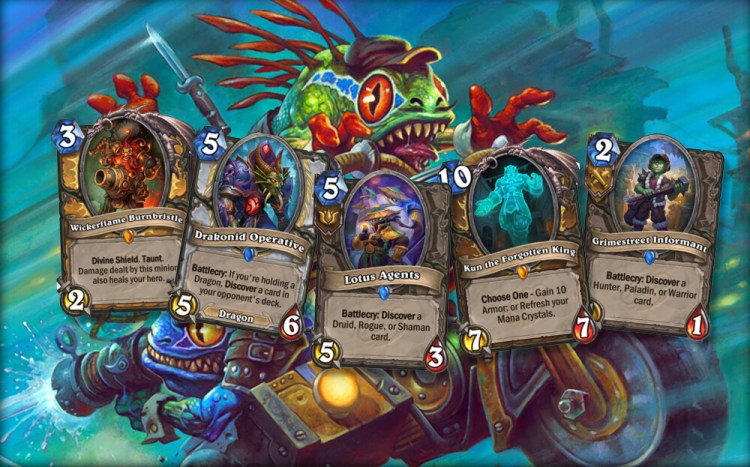Players expected Blizzard to announce a new expansion for its digital-card-game-market leader Hearthstone. They didn’t think it would introduce a new card type that completely changes the way they’ll make decks.
Before, cards have belonged in one of two categories: class (Mage, Rogue, Warrior, Warlock, Priest, Paladin, Shaman, Druid, and Hunter) and neutral, which could go into any deck. You couldn’t put a Hunter card in a Priest deck, for example (unless you used a Thoughtsteal or another spell to add one to yours). Now, Blizzard is introducing tri-class cards in Mean Streets of Gadgetzan, the new Hearthstone expansion coming out in early December.
Tri-class cards can go into one of three classes. For example, the new Legendary Kazakus can go work for Priests, Mages, and Warlocks. In Mean Streets of Gadgetzan, the nine classes have formed three gangs. Priests, Mages, and Warlocks form the Kabal. The Grimy Goons include the Hunters, Paladins, and Warriors, while The Jade Lotus have Rogue, Druid, and Shaman.
Blizzard isn’t grouping classes together randomly. The Kabal, for example, consist of the Hearthstone’s three main spell-users. Each of the three gangs will have three tri-class cards, including one Legendary (like Kazakus, pictured to the right). So, that’s a total of nine tri-class cards. It’s clear that Blizzard is treading carefully with this new mechanics.
Still, this transforms the way that Blizzard has to design cards and how players create decks. Trying to balance a single class is hard enough. With these tri-class cards, Blizzard has to figure out how to make a card that works well with three different classes.
Now, that may not sound too different from what Blizzard has to do with neutral cards, which can go in any deck. But these tri-class cards offer some interesting possibilities. Now, a Priest has a chance to Discover a Mage card. Imagine playing an innocent Priest, only to see your foe destroy you with a Pyroblast.
Or picture a Shaman that gets the Druid spell Innervate and then can suddenly use powerful cards like Fire Elemental for 4 mana instead of 6 or to negate the effects of Overload. Or you could be a Paladin that gets extra value from your Secrets if you pick up the Hunter weapon Eaglehorn Bow (or even worse, a Secret Paladin armed with Freezing Trap or Cat Trick).
It’s also worth noting that players have had ways to steal cards cards from other classes before. The Warlock spell Renounce Darkness allows players to replace all of the class cards in their deck with ones from a different class. Also, the Rogue minion Undercity Huckster gives players a card from their opponent’s class. But tri-class cards are different. Players can put them into their decks when they’re making them, not having to rely on random spells and effects from minions.
But tri-class cards aren’t just about Discovering minions and spells you normally wouldn’t have. Just look at Kazakus again. The spell it allows players to create can be extremely powerful, as we can see in the video below.
Now imagine we find out that this is one of the best cards in the set. That’s a huge boon for Priest, Warlock, and Mage, while the other six classes have no chance to normally play it. Think about how different Hearthstone would have been during the Goblins vs. Gnomes era if Dr. Boom only worked for three classes.
It’ll be interesting to see how the community reacts to these cards and how popular they become. These multi-class cards could become an even bigger part of the game in the future … or it could flop, like those poor Inspire cards from The Grand Tournament.
VentureBeat's mission is to be a digital town square for technical decision-makers to gain knowledge about transformative enterprise technology and transact. Learn More


